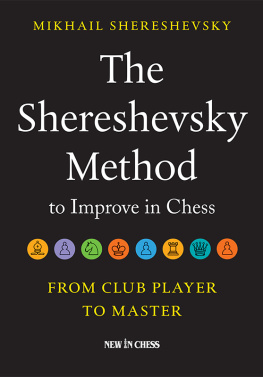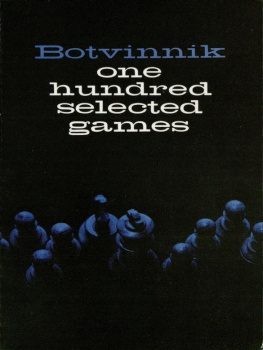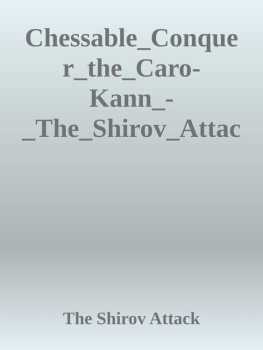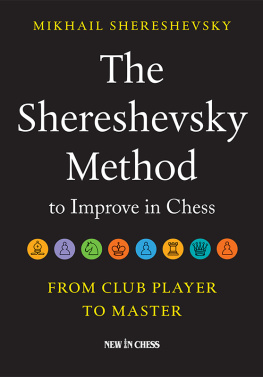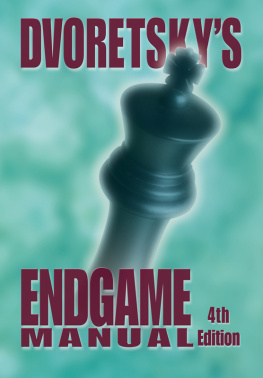chessable: Mikhail Shereshevsky: Endgame Strategy
Here you can read online chessable: Mikhail Shereshevsky: Endgame Strategy full text of the book (entire story) in english for free. Download pdf and epub, get meaning, cover and reviews about this ebook. genre: Children. Description of the work, (preface) as well as reviews are available. Best literature library LitArk.com created for fans of good reading and offers a wide selection of genres:
Romance novel
Science fiction
Adventure
Detective
Science
History
Home and family
Prose
Art
Politics
Computer
Non-fiction
Religion
Business
Children
Humor
Choose a favorite category and find really read worthwhile books. Enjoy immersion in the world of imagination, feel the emotions of the characters or learn something new for yourself, make an fascinating discovery.

chessable: Mikhail Shereshevsky: Endgame Strategy: summary, description and annotation
We offer to read an annotation, description, summary or preface (depends on what the author of the book "chessable: Mikhail Shereshevsky: Endgame Strategy" wrote himself). If you haven't found the necessary information about the book — write in the comments, we will try to find it.
Unknown: author's other books
Who wrote chessable: Mikhail Shereshevsky: Endgame Strategy? Find out the surname, the name of the author of the book and a list of all author's works by series.
chessable: Mikhail Shereshevsky: Endgame Strategy — read online for free the complete book (whole text) full work
Below is the text of the book, divided by pages. System saving the place of the last page read, allows you to conveniently read the book "chessable: Mikhail Shereshevsky: Endgame Strategy" online for free, without having to search again every time where you left off. Put a bookmark, and you can go to the page where you finished reading at any time.
Font size:
Interval:
Bookmark:
% BOOKTITLE = Endgame Strategy
[Event ?]
[Site ?]
[Date ????.??.??]
[Round ?]
[White About this Publication]
[Black ?]
[Result *]
[Annotator Mikhail Shereshevsky]
[PlyCount 1]
[SourceTitle Endgame Strategy]
[Source Everyman Chess]
[SourceDate 2020.08.11]
{Shereshevskys masterful guide to endgame play is an essential work for every aspiring player. Using classic examples from grandmaster practice, together with modern illustrations and instructive games by lesser-known players, Shereshevsky lucidly explains the basic principles of the endgame:} 1. Z0 (1.
Z0 {king centralization}) (1. Z0 {the role of pawns,}) (1. Z0 {exchanging pieces,}) (1. Z0 {suppressing counterplay,}) (1. Z0 {two weaknesses,}) (1. Z0 {
and much more.}) *
[Event ?]
[Site ?]
[Date ????.??.??]
[Round ?]
[White Foreword to the English ed]
[Black ?]
[Result *]
[Annotator Mikhail Shereshevsky]
[PlyCount 1]
[SourceTitle Endgame Strategy]
[Source Everyman Chess]
[SourceDate 2020.08.11]
{Shereshevskys book Endgame Strategy was published in the USSR in 1981 in an edition of 50,000 and was immediately sold out. The author, one of the strongest players from Belarus, has worked extensively as a trainer. In his lessons with young players Shereshevsky has made use of the end teaching methods of one of the countrys leading trainers, M.Dvoretzky, and has worked out a definite system.} 1. Z0 {This book contains an interesting selection of endings. Along with classic examples there are endings both of leading modern grandmasters, as well as of less well known players. The author aims in the first instance to explain the course of the struggle, penetrate into the psychology of the players actions, and to focus the readers attention on the turning points and characteristic mistakes. In contrast to the majority of works on the endgame, the book is divided into chapters not according to material, but according to the playing methods which are most characteristic of the given group of endings. The names of certain chapters have an unusual ring: Do not hurry, The problem of exchanging, The principle of two weaknesses, and so on. For this English edition the author has added a number of endings played in recent times, as well as endings from games by the strongest English players. The main value of the book, in my opinion, lies in the fact that it contains specific advice and recommendations on how to improve endgame technique, for which the practical player will sometimes search in vain when studying multi-volume reference books on the endgame.} (1.
Z0 {A. Yusupov, International Grandmaster}) *
[Event ?]
[Site ?]
[Date ????.??.??]
[Round ?]
[White Introduction]
[Black ?]
[Result *]
[Annotator Mikhail Shereshevsky]
[PlyCount 1]
[SourceTitle Endgame Strategy]
[Source Everyman Chess]
[SourceDate 2020.08.11]
{From the practical point of view, the endgame is the least well studied stage of chess. Chess literature contains very few works on the endgame, and in the main these are reference works, in which theoretical and not practical positions are analyzed. The present book is an attempt to study and systemize certain basic practical principles of the playing of chess endings.
The necessity for a systematic approach to the study of chess endings occurred to me mainly as a result of my teaching experience. It is no secret that, in the preparation of young players, many trainers and teachers devote most attention to the study of numerous opening systems and the forms of middlegame resulting from them. The endgame is always allotted very little time. Some trainers give their pupils the most elementary conceptions of the endgame, assuming that with the general development of a player his mastery of endgame play will also rise. Others demonstrate long and complex analyses from reference books, although the probability of such positions being repeated in a practical game is slight. It is evident that both approaches are a long way from the truth: the mastery of a player is directly dependent not so much upon his amount of theoretical knowledge, as upon his understanding of the general principles of conducting chess endings.} 1. Z0 {
In 1976 I happened to be the second of international master Mark Dvoretzky during the USSR Championship 1st League in Minsk. Dvoretzky adjourned his game with grandmaster Taimanov in a superior position. In one of the lines of analysis a rook ending with f-and h-pawns was reached. Dvoretzky referred to a book on rook endings, and began studying the appropriate chapter. I was surprised: after all, Dvoretzky is a great expert on the endgame. To my question he replied that he knew the basic principles of playing such endings, but did not even attempt to remember lengthy concrete analyses. Later during the tournament we frequently discussed the question of how to study the endgame. Dvoretzky considers it essential to know the classics, to analyze complicated practical rather than theoretical endings, and to find general rules and principles of play in complex endings. And in theoretical endings it is sufficient to know whether the ending is won or drawn, and to have a rough impression of the plan of play. Of course, every trainer has his own style of working, and his own system for preparing players. But it is worth recalling that Mark Dvoretzky, an Honoured Trainer of the Russian Federal Republic, has prepared three Junior World Champions. And all three Valery Chekhov, Artur Yusupov and Sergey Dolmatov are very strong in the endgame.
Of course, the role of exact knowledge in the endgame should not be underestimated. The five-volume series Comprehensive Chess Endings, edited by grandmaster Yuri Averbakh, is the most detailed reference work on this aspect of the game. And even so, in the introduction to this series it is emphasized that a sure indication of a strong player is good playing technique in complex endings.} (1. Z0 {The present book studies such basic principles of play in complex endings centralization of the king, schematic thinking, prophylaxis, and the principles of do not hurry and of two weaknesses. The majority of these were formulated with amazing precision and conciseness in an article by a talented Soviet master who was killed during the Second World War, Sergey Belavenets, an extract from which is given after this introduction. Also examined are typical endgame positions with the advantage of two bishops, an isolated d-pawn, and a 3-2 queenside pawn majority. Some examples are given to study the problem of exchanging, and ways of battling for the initiative in the endgame. In conclusion we give a number of complex endings, in which the various principles expounded in the previous chapters are put into practice.
The knowledge of many rules, and the choice of a specific plan based on them, is mainly of a psychological nature. Therefore in certain examples, especially where Belarusian players are involved, I have laid particular emphasis on the competitive situation in which the game was played. Of course, the rules and recommendations given in the book cannot be regarded as unshakeable and universal endgame laws. Chess is too complex and diverse for that. Latent or manifest in each position are its rules, principles and regularities, many of which a player will often sense intuitively. Without pretending to offer universal recommendations, the author has aimed mainly to help players to be better oriented in endings, and to be more correct and accurate in taking the necessary decisions in practical play.}) *
[Event ?]
[Site ?]
[Date ????.??.??]
[Round ?]
[White 1: Basic Principles]
[Black ?]
[Result *]
[Annotator Sergey Belavenets]
[PlyCount 1]
Next pageFont size:
Interval:
Bookmark:
Similar books «chessable: Mikhail Shereshevsky: Endgame Strategy»
Look at similar books to chessable: Mikhail Shereshevsky: Endgame Strategy. We have selected literature similar in name and meaning in the hope of providing readers with more options to find new, interesting, not yet read works.
Discussion, reviews of the book chessable: Mikhail Shereshevsky: Endgame Strategy and just readers' own opinions. Leave your comments, write what you think about the work, its meaning or the main characters. Specify what exactly you liked and what you didn't like, and why you think so.

